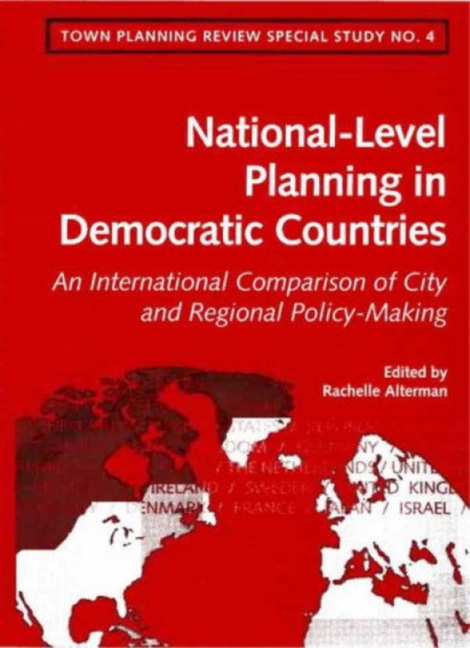 National-Level Spatial Planning in Democratic Countries
National-Level Spatial Planning in Democratic Countries Book contents
- Frontmatter
- Dedication
- Contents
- List of Figures
- List of Tables
- Preface
- About the Contributors
- 1 National-Level Planning in Democratic Countries: A Comparative Perspective
- 2 National Land-Use Planning and Regulation in the United States: Understanding its Fundamental Importance
- 3 Structures for Policy-Making and the Implementation of Planning in the Republic of Ireland
- 4 Rethinking Swedish National Planning
- 5 National-Level Institutions and Decision-Making Processes for Spatial Planning in the United Kingdom
- 6 National-Level Planning Institutions and Decisions in the Federal Republic of Germany
- 7 National-Level Planning in the Danish System
- 8 National-Level Planning Institutions and Decision-Making in France
- 9 National-Level Economic and Spatial Planning in Japan
- 10 Dutch National Planning at the Turning Point: Rethinking Institutional Arrangements
- 11 National-Level Planning in Israel: Walking the Tightrope Between Government Control and Privatisation
5 - National-Level Institutions and Decision-Making Processes for Spatial Planning in the United Kingdom
- Frontmatter
- Dedication
- Contents
- List of Figures
- List of Tables
- Preface
- About the Contributors
- 1 National-Level Planning in Democratic Countries: A Comparative Perspective
- 2 National Land-Use Planning and Regulation in the United States: Understanding its Fundamental Importance
- 3 Structures for Policy-Making and the Implementation of Planning in the Republic of Ireland
- 4 Rethinking Swedish National Planning
- 5 National-Level Institutions and Decision-Making Processes for Spatial Planning in the United Kingdom
- 6 National-Level Planning Institutions and Decisions in the Federal Republic of Germany
- 7 National-Level Planning in the Danish System
- 8 National-Level Planning Institutions and Decision-Making in France
- 9 National-Level Economic and Spatial Planning in Japan
- 10 Dutch National Planning at the Turning Point: Rethinking Institutional Arrangements
- 11 National-Level Planning in Israel: Walking the Tightrope Between Government Control and Privatisation
Summary
The United Kingdom has no national spatial plan for its land use. In this respect at least, it resembles the USA, and its current practice is distinctly different from those countries—like Israel and Japan—which do prepare, adopt and attempt to implement national plans. But, as this paper will attempt to demonstrate, these are distinctions which are not as sharp as they might first appear. There are indeed national-level institutions, and a well-established set of decision-making processes for spatial planning, in the United Kingdom. What is different is the relationship between central government and local government in the conduct of the function of planning.
In theory, land-use planning powers in the UK today belong primarily to local government, with central government playing a supervisory and strategic role. This is a significant change from the centralised vision of town and country planning that underlay the country's innovative post-war legislation. But that is largely because the tasks themselves have changed significantly since that time, a change which has not yet occurred in many countries whose population and gross domestic product (GDP) have both been growing rapidly in recent years. The era of large-scale intervention through the building of whole new towns, slum clearance, mass housing projects, urban motorways and town centre renewal projects is over. In addition, central government has had to surrender many detailed controls over local authorities simply because it could not cope with the minutiae and proved incapable of offering efficient supervision.
Yet central government still retains so central a role in land-use planning as to allow it de facto to maintain the framework of a national spatial plan, not directly but through the development plans prepared by the local authorities. As always in political analysis, we need to stand back from the formal allocation of functions in legislation, because these tell us little about how the system actually works in practice. The true power relationships between central and local government, public utilities, landowners, developers and investors are constantly changing, and to understand them requires that we understand not just the legal forms but also the political and economic realities.
- Type
- Chapter
- Information
- National-Level Spatial Planning in Democratic CountriesAn International Comparison of City and Regional Policy-Making, pp. 105 - 126Publisher: Liverpool University PressPrint publication year: 2001


